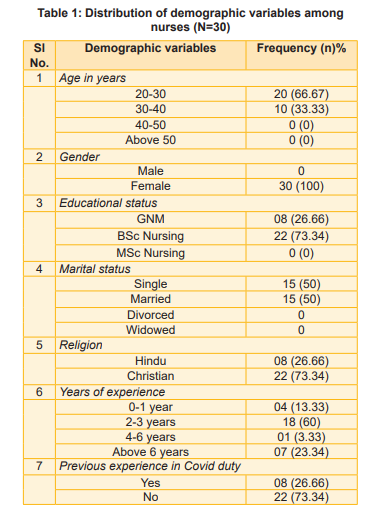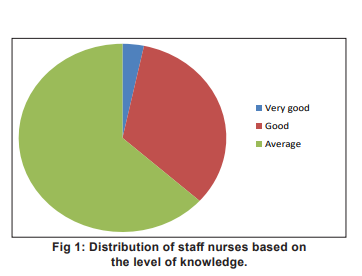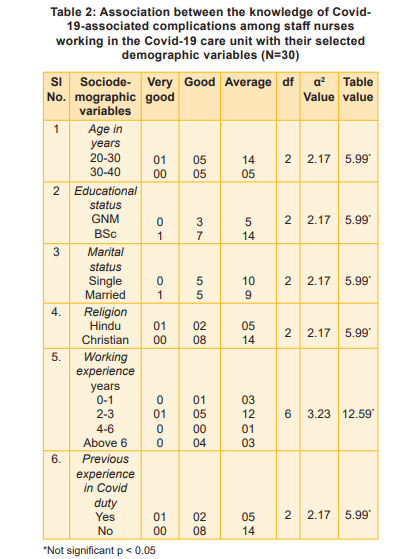Coronavirus Disease (Covid-19) is an emerging respiratory infection caused by a novel corona virus called Severe Acute Respiratory Syndrome Coronavirus 2 (SARSCoV-2). The SARS-CoV-2 virus is similar to Middle East Respiratory Syndrome Coronavirus (MERSCOV) and SARS-COV, which have their origin in bats. Covid-19 disease was detected initially in late December 2019 in Wuhan, Hubei province, China and spread worldwide 2 months later. The symptoms of Covid-19 illness range from very mild respiratory symptoms such as cough and shortness of breath to severe (pneumonia, severe acute respiratory syndrome and kidney failure), with a mortality rate around 4 percent. Covid-19 patients with diabetes, chronic obstructive pulmonary disease, cardiovascular diseases, hypertension, malignancies, human immunodeficiency virus, and other co-morbidities could develop a lifethreatening situation (Khateb et al, 2020).The WHO reported that the novel coronavirus disease has already affected over 6.9 million people, claiming more than 400,000 lives in over 200 nations all over the world. The first case of Covid19 was reported in India on 30 January 2020; the index patient was a student who had returned from Wuhan. The first case of the Covid-19 pandemic in Kerala was confirmed in Thrissur on 30 January 2020. On 12 May 2021, Kerala reported the largest single-day spike with 43529 new cases. During 27-28 July 2021, Kerala reported 22129 and 22056 new cases per day, respectively, which accounts for more than 50 percent of daily new cases of India (Al-Ramadan et al, 2022). People who had severe illness with Covid-19 might experience organ damage affecting the heart, kidneys, skin and brain. Inflammation and problems with the immune system can also happen. A review article shows that the clinical presentation of Covid19 is very wide, often with respiratory complications as a major feature. SARS-CoV-2 is notable in that several patients have developed long-term complications of the virus. Previous studies have shown several potential late complications possible for Covid-19 infection; these include lung fibrosis,venous thromboembolism, arterial thromboses, cardiac thrombosis and inflammation, stroke, brain fog, dermatological complications and overall mood dysfunctions (Desai et al, 2022).
The complications lead to the Covid-19 patient falling into a vicious circle of life and are substantially associated with significant morbidity and mortality. The complications of Covid-19 are multisystem, with pulmonary complications the most commonly reported. Healthcare professionals should be aware that Covid-19 is a differential diagnosis for even the rare but equally debilitating complications and should screen patients who develop these complications to rule out Covid-19 during the pandemic (Ejaz et al, 2020).
A cross-sectional study was conducted to assess the knowledge and practices regarding prevention and control of Covid-19 infection among staff nurses working in a selected area in Raj Shahi Medical College Hospital in Bangladesh. The results showed that the majority of the respondents (83.4%) were female, and 16.6 percent were male. Over two-third of nurses (73.42%) possessed good knowledge about Covid-19, and 17.63 percent had fair knowledge; 73.42 percent of nurses have good practices, 21.84 percent have fair practices, and 8.68 percent have poor practices. There was a significant relationship between nurses’ knowledge and practices (Saha et al, 2020).
As a part of clinical posting and practical experience, we daily deal with patients who have post-Covid syndrome. Most of the patients have respiratory, cardiac, neurological and metabolic complications. Nurses should have adequate knowledge regarding Covid-19-associated complications, as the mortality rate due to Covid-19 is very high these days. Nurses have close contact with infectious patients. Therefore, nurses need to assess their level of knowledge about Covid-19 and improve their level of knowledge. So, it was decided to conduct a study to assess the knowledge of staff nurses in first-line treatment centres about COVID19-associated complications.
Review of Literature
A cross-sectional study conducted in Lucknow to assess the knowledge regarding Covid-19 among health care professionals in April 2020 showed that 65.5 percent had a moderate and another 33.7 percent had a low level of knowledge. The qualification and work experiences did not significantly affect the knowledge levels (Mehrotra & Jambunnathan, 2022).A cross-sectional study conducted by Huang et al (2022) to assess nursing staff knowledge of Covid-19 and their degree of psychological stress in a general hospital in Southwest Province of China in March 2020 on 978 nurses based on a questionnaire showed that the nursing staff provided the fewest correct answers to questions about continuous viral nucleic acid testing specification (38.7%), isolation /discharge criteria (55.1%), and management measures for patients with suspected symptoms (72.8%). Wen et al (2021) investigated the knowledge, attitudes and practices on Covid-19 care among nursing staff and analyse its influencing factors in February 2020, China. The survey was conducted among 7716 voluntary participants. Nursing staff working in isolation wards had higher knowledge, attitude and practice, nursing staff with working experience ≤10 years scored lower than those with working experience ≥20 years, with values of 0.490, 0.654 and 0.747 respectively.
Objectives
This study was set out with following objectives.
Methodology
The research design selected for the study was a non-experimental descriptive research design; 30 staff nurses working in the Covid care unit at Rajagiri Hospital, Aluva (Ernakulam) were inducted. Inclusion criteria were, staff nurses working in the Covid-19 care unit who were willing to participate in the study, and available at the time of data collection. The subjects were selected from a non-probability convenience sampling technique. The study used two tools; the first tool consisted of the personal data of the subjects including age, educational status, marital status, years of experience and previous experience in Covid duty. The second tool was a structured questionnaire that was developed by the researchers to assess the knowledge regarding Covid-19-associated complications. It consists of 30 questions, each having 4 options, out of which 3 were distractors and one was the correct answer. Score is interpreted by: 0-8- poor, 9-15 average, 16-22 good, 23-30 very good. Content validity of the tool was established by experts in the field of medicine and nursing. The reliability of the tool was analysed by the Split method; the reliability of the tool was found in r-0. 917. The tool has an acceptable level of reliability.Ethical clearance was obtained from the institutional ethical committee. The data collection of the main study was conducted during 16 - 23 December 2021. The subjects were explained the purpose of the study and the confidentiality of the information was assured. Consent was obtained from them, and the tool was distributed. Data were analysed in terms of descriptive and inferential statistics. Chi-square test was used to compute, and find out the association between the knowledge score of the nurses and selected demographic variables.
Results
The maximum number of subjects (n=20, 66.67%) were in the age group 20- 30 years (Table 1). Regarding gender, 30 (100%) were females. As for educational status of staff nurses, the majority were BSc (n=22, 73.34%). The majority of the samples were married. As regards religion, 22 (73.34%) were Christian and 8 (26.66%) were Hindu. As per the years of experience, majority of the subjects viz 18 (60%) had 2-3 years of experience, 7 (23.34%) had experience above 6 years, 4 (13.33%) had 0-1 year of experience, and 1 (3.33%) had 4-6 years of experience. Regarding previous experience with Covid-19 patients, 22 (73.34) had previous experience of Covid-19 duty, and 8 (26.66) had no previous experience. Figure 1 shows that the level of knowledge of participants, only 1(3.33%) had a very good level of knowledge,10 (33.33%) had a good level of knowledge, and 19 (63.34%) of the participants obtained an average score.


Table 2 shows that there are no associations between the knowledge of Covid-19-associated complications among staff nurses working in the Covid-19 care unit with selected demographic variables.
Discussion
The present study sought to assess the level of knowledge regarding Covid-19-associated complications among staff nurses working in the Covid care unit in a selected hospital in Ernakulum district. The level of knowledge was classified into four categories: poor, average, good, and very good. The findings revealed that 1 (3.34%) out of 30 nurses had very good knowledge, 10 (33.33%) had good level of knowledge, 19 (63%) had an average level of knowledge, and none (0%) had poor knowledge. An online cross-sectional descriptive study was conducted to determine the knowledge, attitude and practice of health care workers (HCWs) towards Covid-19 in four centres of Makerere University Teaching Hospitals (MUTHS) in Uganda through WhatsApp Messenger among HCWs. HCWs aged 18 years and above constituted the study population. KAP towards Covid-19 was assessed by using a pre-validated questionnaire. All analyses were performed using STATA 15.1 and GraphPad Prism 8.3. Of the 581 HCWs approached, 136 (23%) responded. Overall, 69 percent (n=94) had sufficient knowledge, 21 percent (n=29) had positive attitude, and 74 percent (n=101) had good practices toward Covid-19. Factors associated with knowledge were age >40 years (aOR: 0.3;95% CI: 0.1-1.0; p=0.047) and news media (aOR: 4.8; 95% CI: 31-742.9; p=0.005) and holding a diploma (aOR: 18.4; 95% CI: 1-322.9; p=0.046). The present study findings showed that there is no significant association between knowledge score and selected demographic variables. Calculated value of age 2.171 was significantly lesser than table value 5.99 at 2 degrees of freedom, for marital status calculated value of 1.053 was significantly lesser than table value 5.99 at 2 degrees of freedom, for religion, calculated value of 2.978 was significantly lesser than table value

5.99 at 2 degrees of freedom, for qualification, the calculated value of 0.422 was significantly lesser than table value 5.99 at 2 degree of freedom, for working experience, calculated value of 3.234 was significantly lesser than table value 12.59 at 6 degrees of freedom. A study to assess the knowledge, attitude and practices toward Covid-19 and associated factors among health care workers in Slite Zone, Southern Ethiopia, showed that the participants having MSc degree and training on Covid-19 were strongly associated with knowledge for healthcare workers, older age, training on Covid-19, working experience; type of sources of information were significantly associated with knowledge, attitude and practice of health care workers. Knowledge has been significantly associated with attitude, whereas source of information from friends, working in a primary hospital and having good knowledge were strongly associated with good practice (Yesse et al, 2021).
Conclusion
Research like this should be encouraged to enhance quality care in Covid-19-associated complications. In general, preventing disease and preserving health is a major responsibility of every healthcare professional. Nursing personnel can participate in more hospital-based, and nursing training programmes to improve their knowledge in conducting clinical and community surveys to find out the specific Covid-19 associated complications. This again helps staff nurses to recognise specific Covid-19-associated complications. Healthcare professionals need to be supported with adequate resources for both physical and mental health to prevent complications. While workloads need to be lessened, proper coordination and access to information as promised in the National Health Policy during this public health emergency should be put into practice to ensure quality healthcare services.
1. Khateb M, Bosak N, Muqary M. Coronaviruses and central nervous system management. Front Neurol 2020 Jun 23: 11:715. https://www.frontiersin.org/article/10.3389/fneur.2020.00715
2. Al-Ramadan A, Rabab’h O, Shah J, Gharaibeh A. Acute and post-acute neurological complications of COVID-19. Neurol Int 2021 Mar 9; 13(1): 102-19
3. Joshee S, Vatti N, Chang C. Long-term effects of COVID19. Mayo Clin Proc 2022 Mar; 97 (3): 579-99. doi: 10.1016/j. mayocp.2021.12.017
4. Desai AD, Lavelle M, Boursiquot BC, Wan EY. Long-term complications of COVID-19. Am J Physiol Cell Physiol 2022 Jan 1; 322(1): 1-11. doi: 10.1152/ajpcell.00375.2021
5. Ejaz H, Alsrhani A, Zafar A, Javed H, Junaid K, Abdalla AE, et al. A COVID-19 and co-morbidities. Journal of Infection and Public Health 2020 Dec; 13(12): 1833-39. https://doi.org/10.1016/j. jiiph.2020.07.014
6. Saha AK, Mittra RK, Khatun AR, Reza H. Nurse’s knowledge and practices regarding prevention and control of COVID-19 infection in tertiary level hospital, Bangladesh. Journal of Infectious Diseases 2020,
7(2): S27-S33 7. Mehrotra S, Jambunathan P, Jindal M, Gupta A, Kapoor KM. A cross-sectional survey to assess the knowledge regarding corona virus disease (COVID-19) among healthcare professionals 2021 Jul; 77(2): 437-42. doi.org/10.1016/j.mjafi.2020.07.001
8. Huang H, Zhao WJ, Li GR. Knowledge and psychological stress related to COVID -19 among nursing staff in a hospital in China. JMIR Form Res 2020 Sep 18; 4(9): e20606. doi: 10.2196/20606
9. Wen X, Wang F, Li X, Gu H. Study on the knowledge, attitude and practice [KAP] of nursing staff and influencing factors on Covid-19. Front Public Health 2021; 18:8:560606. doi:
10.3389/ fpubh.2020.560606 10. Olum R, Chekwech G, Wekha G, Nassozi DR, Bongomin F Coronavirus disease, 2019: Knowledge, attitude and practice of healthcare workers at Makerere University teaching hospital, Uganda. Front Public Health 2020 Apr 30:8:181. doi: 10.3389/ fpubh.2020.00181
11. Yesse M, Muze M, Kedir S, Argaw B, Dengo M, Nesre T, et al. Assessment of knowledge, attitude and practice toward COVID19 and associated factors among healthcare workers on Silte Zone, Southern Ethiopia. PLOS One 2021 Oct 5; 16 (10): e0257058. doi: 10.1371/journal.pone.0257058

This work is licensed under a Creative Commons Attribution-NonCommercial-ShareAlike 4.0 International License.